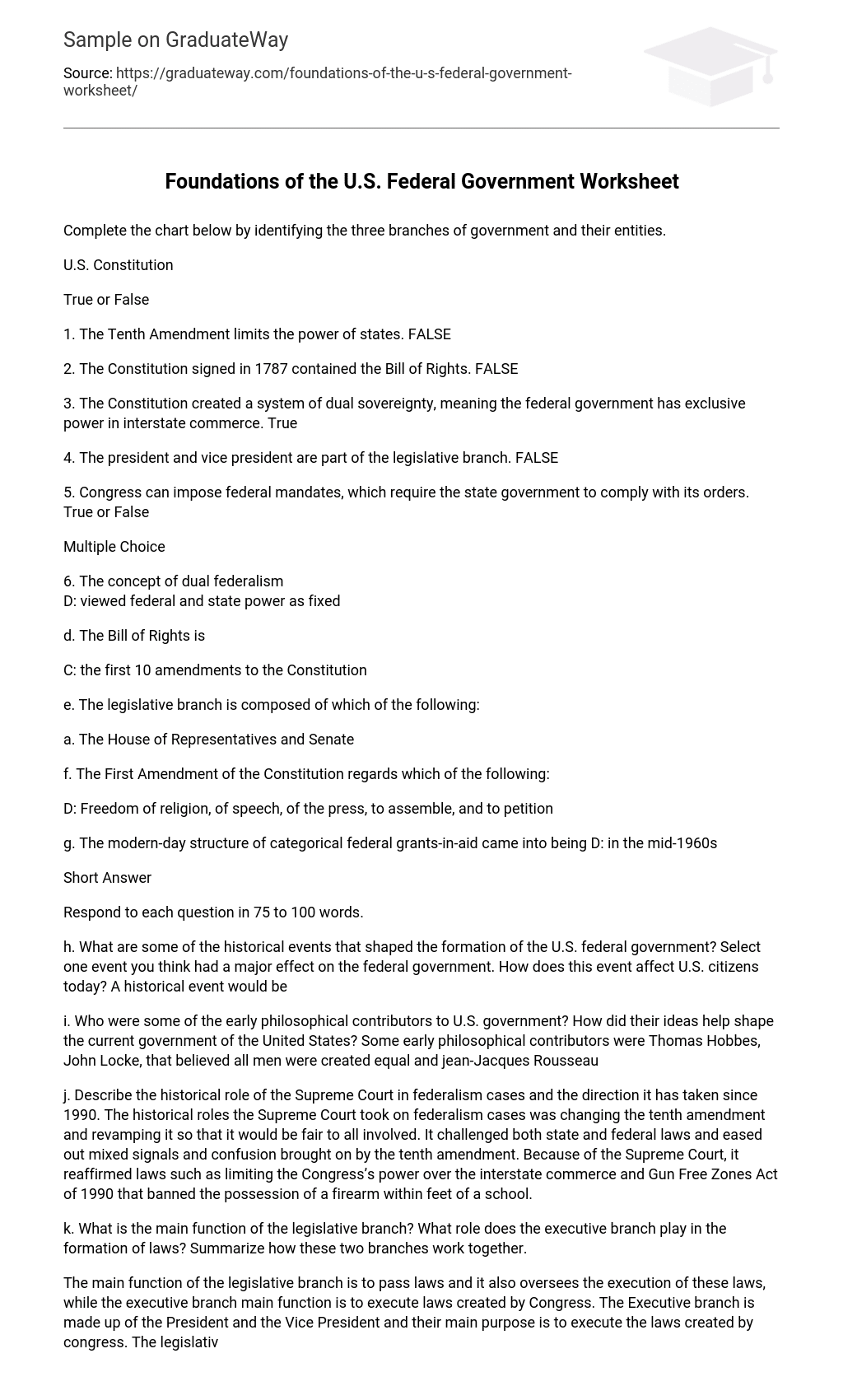Complete the chart below by identifying the three branches of government and their entities.
U.S. Constitution
True or False
1. The Tenth Amendment limits the power of states. FALSE
2. The Constitution signed in 1787 contained the Bill of Rights. FALSE
3. The Constitution created a system of dual sovereignty, meaning the federal government has exclusive power in interstate commerce. True
4. The president and vice president are part of the legislative branch. FALSE
5. Congress can impose federal mandates, which require the state government to comply with its orders. True or False
Multiple Choice
6. The concept of dual federalism
D: viewed federal and state power as fixed
d. The Bill of Rights is
C: the first 10 amendments to the Constitution
e. The legislative branch is composed of which of the following:
a. The House of Representatives and Senate
f. The First Amendment of the Constitution regards which of the following:
D: Freedom of religion, of speech, of the press, to assemble, and to petition
g. The modern-day structure of categorical federal grants-in-aid came into being D: in the mid-1960s
Short Answer
Respond to each question in 75 to 100 words.
h. What are some of the historical events that shaped the formation of the U.S. federal government? Select one event you think had a major effect on the federal government. How does this event affect U.S. citizens today? A historical event would be
i. Who were some of the early philosophical contributors to U.S. government? How did their ideas help shape the current government of the United States? Some early philosophical contributors were Thomas Hobbes, John Locke, that believed all men were created equal and jean-Jacques Rousseau
j. Describe the historical role of the Supreme Court in federalism cases and the direction it has taken since 1990. The historical roles the Supreme Court took on federalism cases was changing the tenth amendment and revamping it so that it would be fair to all involved. It challenged both state and federal laws and eased out mixed signals and confusion brought on by the tenth amendment. Because of the Supreme Court, it reaffirmed laws such as limiting the Congress’s power over the interstate commerce and Gun Free Zones Act of 1990 that banned the possession of a firearm within feet of a school.
k. What is the main function of the legislative branch? What role does the executive branch play in the formation of laws? Summarize how these two branches work together.
The main function of the legislative branch is to pass laws and it also oversees the execution of these laws, while the executive branch main function is to execute laws created by Congress. The Executive branch is made up of the President and the Vice President and their main purpose is to execute the laws created by congress. The legislative branch is composed of the House of Representatives and the senate, these two make up Congress, who creates the laws.
l. What is the role of the judicial branch? Who elects members of this branch? Briefly describe the judicial process. The Judicial branch is made up of courts: the Supreme, Circuit, the magistrate, which is local, and Municipal (city) courts. This branch interprets the laws. State judges are elected by the citizens, rather than being appointed. Their duties include interpreting state laws, settling legal disputes, punishing violators of the law, hearing civil cases and protecting rights granted by the state constitution. They also determine the guilt and innocence of those accused of violating criminal laws of the state and they act as a check upon the legislative and executive branches of government.
Short Essay
m. In 250 to 300 words, define federalism and summarize its role relative to the current U.S. political climate.
Federalism is a political system allows states united under a central government to maintain a measure of independence. This basically means that it allows each state to have their own set of laws but everyone follows the laws of the nation. There are certain things that can be done in Louisiana that are illegal in Texas. In some states it’s legal to have medicinal marijuana but not in Louisiana and in other states a man can be legally married to a man but in Louisiana their marriage is not considered legal. This among other things is made possible because of federalism





